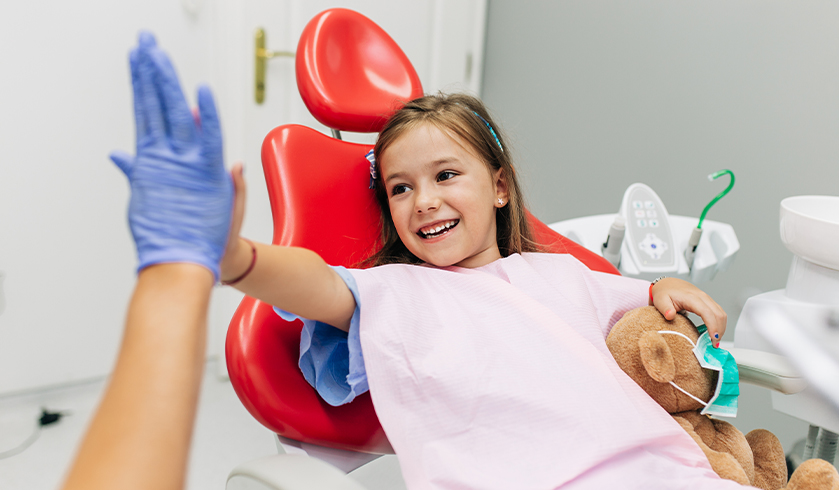Dental Injuries in children are quite common due to their boundless energy and love of exploration as they develop physically and mentally. However, dental emergencies may arise that is highly traumatic to the child.
Receiving emergency dental care as soon as possible is vital for the child’s oral and overall health. Ensuring teeth are restored and gums treated for infection-free growth allows children to develop healthy dental and oral structures. Bite function, nutritional intake, communication ability, facial expression and confidence depend on it.
For children who fear dentists and dentistry, dental phobia treatment gives added calmness, particularly in emergency care situations when anxiety may obstruct the treatment.

Dental injuries in children can result in a lot of blood that looks worse than it actually is. The emotional trauma may rise and impact how children feel about future oral treatments. Contacting an emergency dentist immediately can prevent trauma escalation and provide the needed relief to reduce anxiety and pain.
If proper dental care is not received for a childhood dental emergency, the child may develop dental problems affecting their ability to pronounce words and express themselves. Later dental and health issues may arise in adulthood, requiring more extensive and costly treatment.
Childhood Tooth Loss or Dental Avulsion
It is normal for children to lose milk teeth and gradually develop permanent teeth on the upper and lower jaws. Healthy teeth development is essential to allow children to receive balanced nutrition, express themselves clearly and feel confident about their appearance.
Dental trauma and dental injuries in children may negatively impact these aspects of their development. Contacting an emergency dentist and immediately treating the dental problems reduces the trauma associated with the event. It also allows children to be professionally treated so the dental problem does not develop into adulthood or cause further health complications.
Children are vulnerable to oral trauma as they grow and need adults or guardians to ensure their permanent teeth develop correctly, without bite problems, jaw disorders or tooth decay. Leaving irregularly spaced or misaligned teeth untreated can lead to malocclusion or jaw disorders that affect the individual’s quality of life. Orthodontic treatment with braces may be required.

Toddlers often hurt themselves on sharp edges or hard surfaces. By buffering these with soft coverings, dental injuries in children may be reduced. Adults and guardians have a responsibility to protect a child’s oral health. If a permanent tooth is knocked out or avulsed, saving the tooth is essential and can be accomplished by visiting a dentist for re-attachment. Using a temporary emergency dental kit may help while contacting an emergency dentist for an appointment.
Children often enjoy chewing toffees and sweets, and moderating sugar intake can reduce toothache, tooth decay, and tooth loss. Fillings are frequently pulled out when sticky candies are chewed, and children risk filling loss. An emergency dental kit and sealing the tooth cavity with dental cement can prevent infection before receiving professional dental care.
Older children who already have their permanent set of teeth may need an avulsed tooth re-implanted to restore the dental structure. Saving the tooth and re-inserting it back into the tooth socket enables the gum tissue to reattach and grow back into its normal, healthy position. Dental restoration may be recommended to fill the missing tooth gap where a tooth is entirely lost.
When dental injuries in children occur, parents and guardians respond differently. While some understand the importance of receiving emergency dental care, others may let fear or monetary concerns stand in the way. Childhood dental injuries require immediate emergency dental care for the child’s oral and overall health.
Leaving the condition untreated or self-treating the emergency and not seeking professional dental care can lead to dental problems and ill-health later in life, which is far more harmful and costly to treat. Certain dental emergencies in children escalate into medical emergencies that may become life-threatening. Taking the right step to contact an emergency dentist prevents accumulated oral trauma and lowers the risk of a medical emergency.
Childhood dental emergencies can restrict breathing or cause head injuries and oral trauma. Therefore, it is vital to get help for the child and to have the injury assessed for proper professional care. Dental injuries in children may prevent healthy eating and receiving the nutrients children’s bodies need. Oral infections are easily treated with antibiotics prescribed by a dentist or doctor where necessary.
Dentists try to make parents, carers and guardians aware of what constitutes a childhood medical emergency. Dental injuries in children require urgent child dental care are an infected or broken tooth. A toothache may indicate spreading tooth decay that can lead to tooth loss and ill-health. Regular dental check-ups allow dentists to monitor children for tooth cavities and decay signs and provide preventative dental care.
Dentists also play a role in teaching children how to maintain oral hygiene at home, brush teeth properly and floss to remove food debris and sticky plaque after meals and before sleep. When childhood oral hygiene is neglected, tooth decay may develop. Monitoring moderate sugar and acid intake also helps to prevent tooth decay.
Children do chip and fracture teeth as they grow and explore their world. They have accidents and injuries where teeth can become sensitive and painful. Emergency dental kits may contain dental cement to seal a tooth crack, chip or fracture temporarily. However, infection prevention is best sought from a dental professional, so the child enjoys healthy oral function.
A dentist may recommend root canal treatment where an infection has set in within the dental pulp or the root canals. This is done to eradicate the infection and save the existing tooth. Oral infection in children needs to be halted immediately to preserve the natural dental structure.
Adolescents and young people involved in contact sports may experience oral injury if they do not wear a mouth guard to protect their teeth and gums. Dentists now provide a range of mouth guards and shields to meet the needs of children and young sportspeople. A mouthguard can prevent dental emergencies and allow young people to develop healthy bite functions.
Preventing Child Dental Emergencies
Children cannot be shielded from all accidents and injuries. But parents, carers and guardians can take steps to reduce the risk of children’s dental emergencies by:
